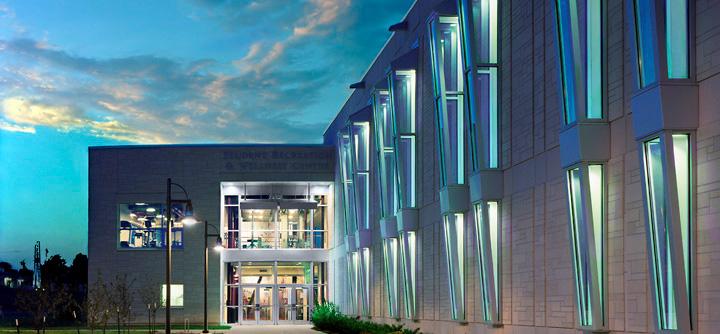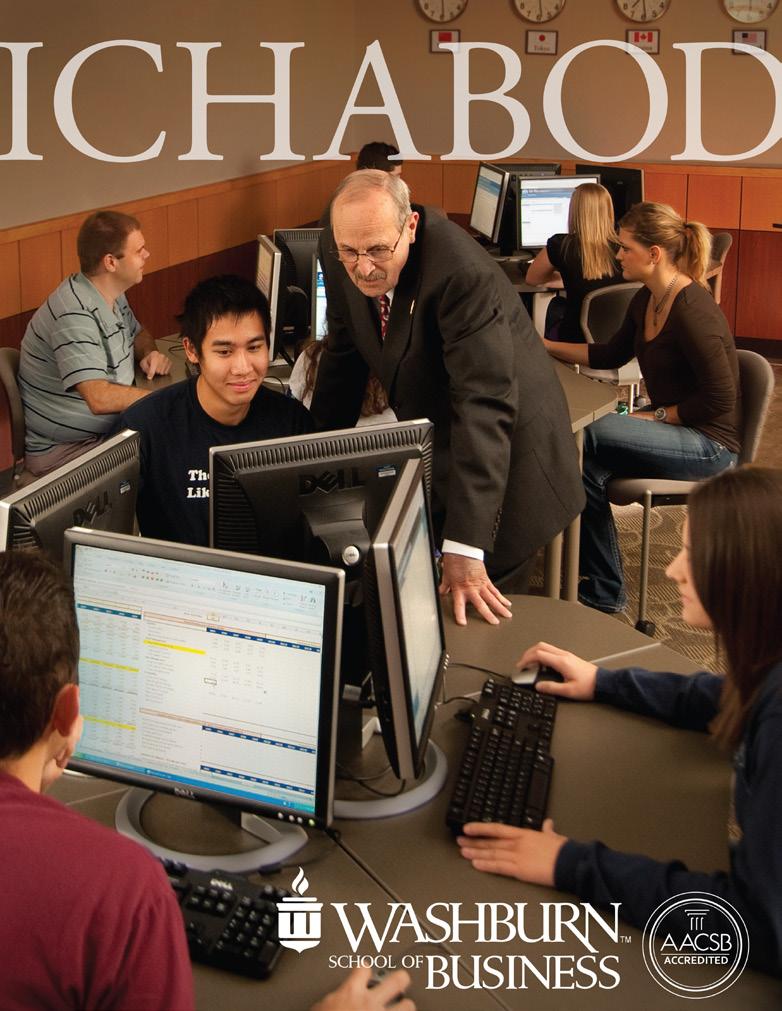Bod Magazine
Healthy habits for a first time mini-fridge owner
An inside look at Greek life
From museum to mom-and-pop drive-in, Top City has something for everyone
5 professors every student should meet
















Healthy habits for a first time mini-fridge owner
An inside look at Greek life
From museum to mom-and-pop drive-in, Top City has something for everyone
5 professors every student should meet















story by Josh Rouse photos by Mallori Shehi
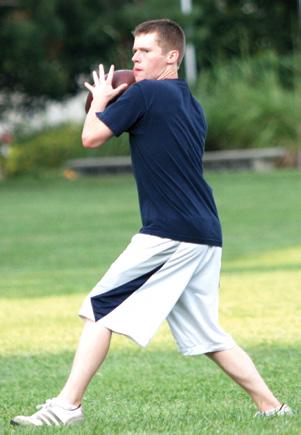
One of the easiest ways to socialize on Washburn’s campus is the intramurals program, hosted by the Student Recreation and Wellness Center.
Each semester, the SRWC hosts a bevy of intramural activities, from the traditional team sports to the not-so-traditional independent events, such as Texas Hold ‘Em poker, trivia and video game tournaments. John Cummings, program coordinator at the SRWC, has seen the program transform into what it is today.
“We didn’t add a whole lot last year—I think the biggest thing we added was a beanbags tournament,” said Cummings.
“We’re at that point with the intramural schedule where we do have some pretty good attendance in some of our main stays, some of our team sports, and then some of our smaller sports do have their niches where they have 10 or 12 people that are participating in it that may not participate in some of our traditional team sports but they do enjoy playing Guitar Hero or Wii Bowling or something like that.”
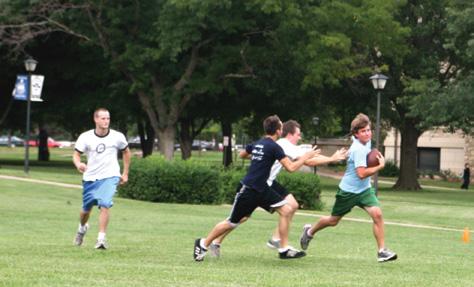
Right: Members of Delta Chi fraternity clash with fellow Washburn students for victory on their football field, aka the front lawn of the Memorial Union.
Cummings said the SRWC’s intramurals program is a huge draw for students, both for those who are hardcore competitors and for those who are less interested in competing and more interested in making friends.
“It’s an opportunity to meet more people,” said Cummings. “It’s an opportunity to remain competitive if you do have that competitive drive. It’s something you can take an hour out of your day or out of your week and be able to get that competitive fix, if you will.”
Cummings added that the SRWC has been seeing a much larger group of student organizations putting teams together and participating as a means of team building, and that when an organization gathers together for reasons outside of their specific goals, it’s a great way to enhance team cohesion.
Aside from intramurals, the SRWC hosts different events and has other programs for students to enjoy. During Welcome Week, the SRWC hosts Rock the Rec, a large event that Cummings encourages both incoming and returning students to participate in. In the spring, the SRWC partners with Residential Living to host All Night at the Rec, an alternative programming event with free food,

games and prizes. The SRWC also has group exercise and wellness programs.
Currently there are more than 20 group exercise classes offered every week during the school year.
“Just by participating, for instance, in some of the incentive programs through our wellness program, students and participants have the opportunity to earn free SRWC stuff like T-shirts, and sweatshirts,” said Cummings. “It’s definitely something you can get by coming in and being healthy and active.”
There are several ways to get involved with the intramurals program. Many events require registering a team at the SRWC, but some don’t require any planning from students ahead of time.
“One of the best ways [to get involved with intramurals] is coming down to the intramural events,” said Cummings.
“While the backbone of the program is our team sports, we do have many day-of events where it’s just like come down and shoot a basketball for our Hot Shot contest—it takes five minutes to do. Come down and participate in our Wii Bowling contest, I mean, how long does it take to play a game on the Wii?”
For more information on the Student Recreation and Wellness Center, visit www.washburn.edu/getfit.
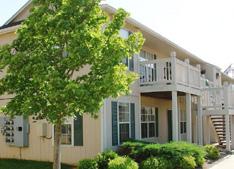
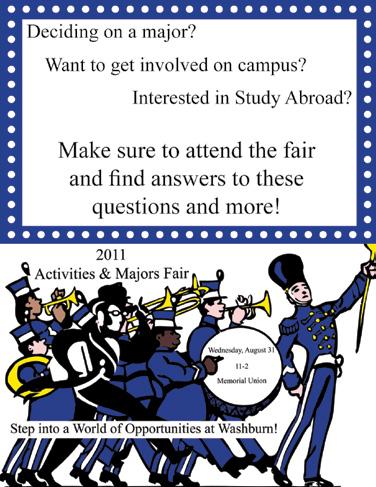


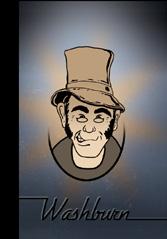









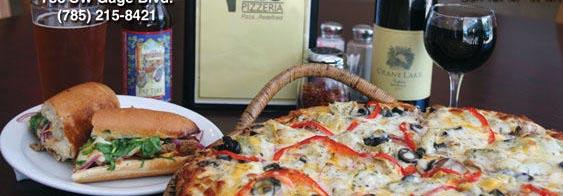

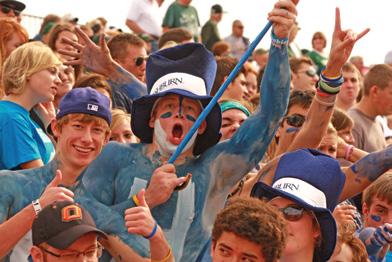
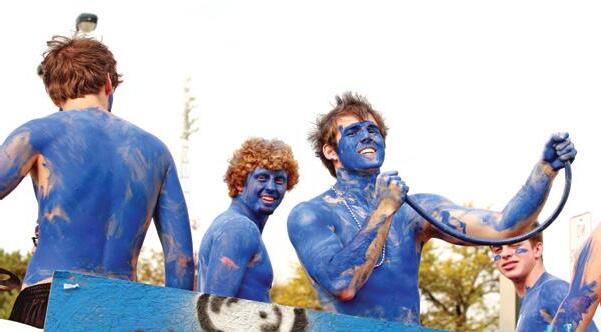
coming without their school spirit, and colors of blue and white from head to toe.
Some of Washburn University’s campus activities and events are beginning to take shape as the 2011-12 academic year looms on the horizon.
With these activities comes the hope that new students will become engaged in Washburn University, and see all sides of what the campus offers. Events such as Family Day, the Activities and Majors Fair, the Nall Speak Off and History Day are annually offered to students to either attend or participate in.
Through these events, the hope is that students will connect to the university. One of the largest staples of the fall semester on campus is Homecoming.
And with Washburn University Homecoming 2011, it will be hard to not find something of interest.
“It really is just a good week to see what groups are doing,” said Denise Ottinger, vice president of student life.
The theme for this year’s Homecoming festivities is “Fear the Bod” which is due to the events being right before Halloween on October 24-29.
“It’s really cool to see how students from different ends of campus can come together and perform and do things together,” said Michael Kitowski, vicepresident of WSGA and student representative for the homecoming committee. “Campus life as a whole comes together for the entire week.”
Prior to Homecoming is another large -
ly attended event known as Family Day. This event is a chance for many students to invite their parents or friends to Topeka and connect with them on campus or out on the town.
Memorable events for students also include those planned by the Washburn Student Government Association and the Washburn University Campus Activities Board. Last fall and spring, WSGA brought famous hip-hop artist Joseph Simmons, or “Rev. Run,” to Washburn, as well as animal and nature conservationist Jeff Corwin.
“The magnitude of speakers that we get and the quality of speakers that we get coming to Washburn is a fantastic thing and is comparable to the University of Kansas, Kansas State University, Fort Hays State University and other area schools,” said Kitowski. “So it’s not like we’re just a little school in Kansas. We can still bring big name speakers and I hope that’s something we can continue providing for students.”
CAB has also been at work to provide events for students. This past year, included an acoustic set featuring Javier Colon, who has been featured on NBC’s “The Voice;” and a presentation from Eric Alva, who was the first wounded soldier in Operation Iraqi Freedom, and is also a gay rights activist.
For students looking to get connected with local and regional job market op-
portunities, the Career and Graduate School Fair will take place on September 13. The fair is sponsored by Washburn University Career Services.
“We encourage all students to attend the career fair,” said Dave Williams, career services specialist. “We’ve actually been putting more emphasis on freshmen and sophomores recently. We call them “explorers” versus “job seekers.” So, we recommend the “explorers” go to the career fair and start looking at careers, start networking, start talking to people and finding out what appeals to them.”
Numerous other annual events will be held during the fall and spring semesters and can be viewed on the university calendar, which is available on Washburn’s website. Most are free and open to all students. While students may have to miss events due to classes, homework or work, Kitowski recommends that students try to attend events when they get the chance.
“Ultimately, students are here for an education so if they want to put their education first, then that’s what they should be doing,” said Kitowski. “But I think being involved helps you get more immersed in the Washburn culture, and in your college experience; both academically and socially.”

story by Kori Reist

From the Kitchen of:
Attending college is exciting but nerve racking, and being a freshman makes it even more worrisome. As a newbie on campus there are so many things to consider: making it through the first year, balancing a social life and maintaining an academic one, meeting friends by getting involved on campus and surviving established living arrangements. All college babies will eventually grasp what’s going to make or break their university experience. It’s more a question of—will they do it avoiding the freshman 15, or even worse graduating with the college 30?
Living in the dorms in particular can be testing on the waistband. And it’s really a no-brainer; make healthy decisions. Avoid a constant diet of fast food or eating out. Alcohol is heavy on the calories so limit the partying. Students can choose healthier foods to stock their rooms with. Rest your brains Washburn freshman; we’re prepared to spell it out.
Wake Up Call. Breakfast is the most important meal of the day; redundant yes, but very true. Make breakfast the largest meal of the day. Eating heavier in the morning will keep hunger sated until a snack break or even lunch. Breakfast can be more than cold cereal. Bring a toaster to the dorms. Try popping in a low fat waffle. Spread on some protein packed peanut butter and pile with chopped bananas. Drizzle sparingly with honey or low fat pancake syrup. This is guaranteed to fill the tummy.
Get a jump start. For many college students lunch is a blur, it’s a time to wrap up that put-off paper or unfinished homework. Take time to refuel, lunch is the halfway mark through the day. Try eating a bowl of leafy greens. Throw in as many veggies as possible. Getting enough protein in the dorms can be difficult, but it’s possible. Add some canned tuna, salmon or chicken to that salad. Top it with some almonds or seeds and
a favorite vinaigrette. Lindsay Vannicola, a former resident of the dorms and a senior nursing major, said she relied on trusty peanut butter and jelly in the dorms. Her personal fave was microwavable Hamburger Helper.

Treat yourself. Hungry? Eat something. When that tummy starts to rumble, it’s time for a snack. According to Christal Omni, lifetime wellness instructor, the best foods to keep in that minifridge are fresh fruits and vegetables.
“It’s the best thing to snack on,” Omni said. “They’re packed full of everything you need, grab that instead of something from the vending machine.”
Still starving? Eat something full of protein. Try a hardboiled egg or some low fat yogurt. For something salty, snack on low fat popcorn or pretzels. And for that sweet tooth, have a low fat pudding cup.
Come and get it. For most, dinner is the heaviest meal of the day. Change that up, eating lighter before bed is better. The body is not burning as many calories at night because it’s resting; therefore having an enormous meal means it just sits there. Eating less in the evening will also help with having a heartier appetite for breakfast. Try having soup with whole-wheat crackers. Need something more substantial, have a low fat frozen dinner. Still not enough,
add an apple or a handful of baby car rots.
Not only can eating from the dorm room be healthier, it’s easier on the bank account. Though, according to Joel Bluml, the cafeteria and market do have some beneficial food choices. Bluml, director of the Student Wellness and Recreation Center, said Chartwell’s has a program called Balanced U. The pro gram helps students navigate on cam pus dining and they use different icons and things for items that are healthy.
“We’re actually trying to partner with them to do a better job of that,” Bluml said. “One example is that we have a cup thing we’ve been doing. It’s more sustainable. It’s reusable and also a little smaller in size. But it’s for our Ac tive Ichabods, so Chartwells will honor it, and it’s refillable for 39 cents. It’s a sixteen ounce so you’re not drinking as many of those empty calories.”
Fruit (fresh, canned, or dried)
Low fat granaola bars
Bagels
Low fat cream cheese
Milk
Juice boxes (100% juice)
Wholegrainbread
Dry cereals
A Healthier Dorm Pantry
Create a pantry; have a three to four tiered plastic shelf or drawer. Designate one shelf for each meal time and have an extra space for snacks. The same can be done in the mini-fridge. Review this list from the University of North Carolina for healthier options. To avoid repetition some are listed for only one category. They recommend adding protein to every meal and always having fresh fruit or vegetables available.

From the Kitchen of: Mr. Ichabod
Salad greens
Pitawithhummus
Cottage cheese
Veggies
Soups (minestrone, lentil, split pea,
From the Kitchen of: Mr. Ichabod
Potatoes/sweetpotatoes (to bake in microwave)
Frozen vegetables
Frozen burritos (flour tortillas, pea, chicken with vegetables)
cheese or black beans
Frozen dinners (low fat dinner with vegetables included


From the Kitchen of: Mr. Ichabod
Low fat microwave popcorn


String cheese sticks
Graham crackers
Nuts/seeds
Low fat pudding cups
Juice boxes (100% juice)
Baked tortilla chips with salsa
Pretzels





& add Washburn pride to your ride
Show your Ichabod pride by putting a Washburn license plate on the back of your vehicle.
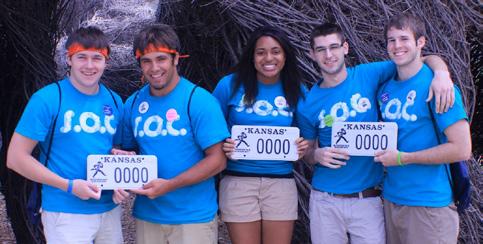
Special FREE Plate Offer for Students:
The Alumni Association will waive the $50 annual fee.
The only financial commitment is to purchase the plate from the County Treasurer- a ONE-TIME plate fee of $45.50.
The next time you renew your plate, there will be NO ADDITIONAL FEES
You don’t have to wait until your current plate expires in order to get your new Washburn plate. Swap your existing plate for a new Washburn Ichabod plate today!
If you have questions, please refer to the web site: http://www.washburn.edu/alumni/license-plate.html or feel free to give us a call at 785.670.1643
Welcomes you to Washburn!
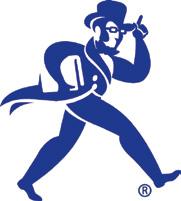
The College of Arts and Sciences- where great futures start!
story by Brian Dulle

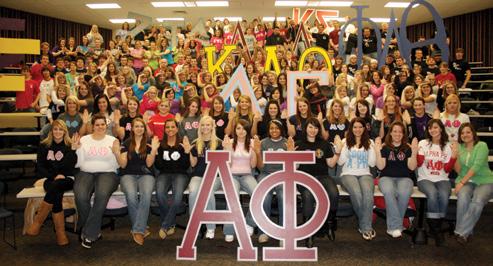
Moving away from home, living in the dorms and meeting all new people can be chaotic for college freshmen.
When first arriving to college, it can be easy for a new student to get lost in the college atmosphere. However, becoming an active part of the Washburn community doesn’t have to be a lonely process.
Greek Life has been present at Washburn University for about a century now, and consists of five fraternities, Alpha Delta, Delta Chi, Kappa Sigma, Phi Delta Theta and Sigma Phi Epsilon as well as four sororities, Alpha Phi, Delta Gamma, Kappa Alpha Theta and Zeta Tau Alpha.
“When I first decided on coming to Washburn, I actually did not want to be in Greek Life,” said Betsy Sloop, a member of Kappa Alpha Theta sorority. “I stayed with Kappa Alpha Theta when I did Ichabods at Night and I wasn’t sure if it was for me. A couple of my friends went through recruitment and said that

it was awesome, and that should do it. I was still a little scared, but by spring semester of my freshman year I started hanging out with the Thetas more and I really enjoyed it.”
Sloop is in the elementary education program, and said the teacher she paired up with last semester was actually an alumna of her sorority.
“I was excited, and she was very excited to help me,” said Sloop. It’s just nice to meet people in the community, even people that are not just Thetas, but greeks in general.”
Greek Life is great for students looking to get involved, according to Derek Fritz, a member of Kappa Sigma fraternity.
“Involvement is what can define a college experience and it’s really what the whole college experience is about, and it’s simply how you have the most fun,” said Fritz.
Greek Life has helped many students to grow as individuals, and has a long history of helping turn “quiet kids” into
“social butterflies.”
Ryan Masilionis, a member of Delta Chi fraternity, has enjoyed the opportunities that Greek Life has to offer, especially when it comes to meeting new people, including students from colleges outside of Washburn.
“You meet so many people outside of your school, that are part of your fraternity, but at a different school”, said Masilionis. “Probably the biggest thing I get out of being in a fraternity is meeting new people. There are lots of business opportunities, and you build lots of friendships.”
Mariah Hundley-Cockel, a member of Delta Gamma sorority, joined Greek Life for a chance to meet people in a way that may not have been possible amongst her classmates and dorm-mates alone.
“I wanted to experience it on a different level then just going to class and staying in the dorms,” said HundleyCockel. ”I lived in West Hall my freshman year and it was really difficult to meet people because there were not very many people living there.”
Greek Life is not for everyone, according to Hundley-Cockel, but she suggested that every student should at least check it out.
“Being Greek, you’re not pushed only by your fraternity or sorority in the Greek community, but if you find your house and love it enough, it makes YOU want to do better,” said Hundley-Cockel. For more information about Greek Life at Washburn, visit www.washburn. edu/getalife.

story by Matt Kelly
Don’t settle for second best: Sometimes new students have a hard time finding professors that fit their style. Honestly, some professors are authoritarian, and in some cases, don’t even like teaching. Problem is, they forget that every student is unique, and needs to be listened to in order to learn.
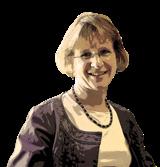
Kim Morse is a firecracker: She knows how to grab the students’ attention, and keep them awake and involved. Her enthusiastic teaching style doesn’t go over well with students who enjoy their classroom naptime. Some might even describe her as… well…
Don’t be ignored. Every student has a voice—use it. Look for people who care about their students. From the boring standardized-test-giver to the self-absorbed lecturer, professors have their own ways of getting things done. Fortunately, many have managed to find a happy medium. This is known as the interactive teaching style.
“Loud, apparently is one of my characteristics,” said Morse, professor of history. “I’ve even been known to stand on furniture every now and then. Sometimes there are things that just need emphasis, and emphasis takes volume, I guess. It’s very difficult to hide in my classes.”
Many students find Morse’s teaching style refreshing and inspirational. In some cases, students have taken her classes for general education credits, and declared themselves history majors as a result.
“She was the professor responsible for me declaring history as my major, and both pushed and motivated me more than any other professor,” said Matt Peterson,
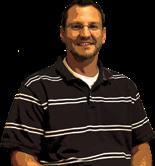
English can’t be taught merely through lecture and exams. It takes a master communicator to teach the art of communication.
Danny Wade prides himself on sharing “the stage” with his student, and believes an open forum is best when teaching an English class, because it’s not just about learning new information—it’s a matter of self-discovery.
“When you walk by my classroom, you won’t just hear my voice; you’ll hear my
Don’t risk being stuck in a class with a Ben Stein impersonator. Find someone who recognizes the importance of student interaction. There are lots of excellent teachers to choose from at Washburn. Don’t be afraid to find the right fit.

Biology: John Mullican
terest in students, learning their names, and treating them as equals, Mullican believes they learn more effectively. In a way, the students become his friends, and he’s always available to help them when necessary.
er than a slideshow.
He knows many public high schools can be hit ‘n’ miss in preparing students for the demands of a college science class. So he starts with the basics for all of his new students.
Morse believes it’s OK to get off track. When she appreciates where the conversation is going, she lets her students change the course of the discussion. But don’t be fooled. She’s no pushover. She expects great things, and is well respected by her students.
“The quality of work she expects out of her students, and the fact that she pushes students to work their hardest, was truly motivational throughout my undergraduate time at Washburn,” said Peterson.
student’s voices,” said Wade. “I’m more of a leader of discussion and questioning, as opposed to a depositor of knowledge.
I believe you want your students to create knowledge, and not just absorb your knowledge.”
The ability to articulate through writing is debatably the most important skill to have when finding work after college, and can make or break a student’s career. Learning to think independently, and share opinions is what college is all about.
When students are encouraged to share their ideas, they appreciate their time in the classroom, and enjoy learning.
“The classroom is an avenue and a venue to share your understandings. Individuals want to share, and want their knowledge to be validated. When you
have that shared classroom approach, students are more inclined to listen to what you have to say.”
Wade was Val Roberson’s favorite professor. She recently finished her English degree at Washburn, and was impressed by Wade’s “love” for his students, and his genuine interest in the their lives.
In his free time, Wade reads young adult literature, and enjoys talking to students, like Roberson, about the books that interest them, and shares his love for literature with them.
“He’s eager to share his knowledge with his students, but at the same time respects the opinions and viewpoints of every single person in the class. He encourages all of his students to do what they are passionate about,” said Roberson.
It’s not uncommon for students who need science credits to look for the safest bet. Lots of hardworking students want professors who can teach anyone, regardless of prior science knowledge. Sound familiar? Well search no more. Meet John Mullican of the biology department. Make no mistake. His classes can be difficult for some, but by showing an in-
“He just takes the time to talk to the students, and get to know what kinds of people they are, and is really interested in what they’re doing, and what their career goals are,” said Wendy Stafford, biology department secretary.
For freshmen, Mullican likes to simplify things, and usually avoids PowerPoint presentations. This is his way of slowing the pace for first year students, and explaining things through interaction, rath-
“My philosophy is that a lot of students are coming to college with little good preparation from their high school experiences,” said Mullican. “I try to let everybody start out at the same place by putting things on the board, and using lots of real world examples. I try to make it interactive and fun.”
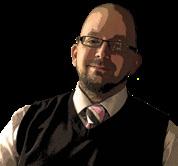
Some professors are obsessed with political correctness. So much in fact, they avoid saying anything controversial, no matter how much research they’ve done on the subject. That’s not the case with John Paul of the sociology department. He knows his stuff, and isn’t afraid to be straight with his students.

Many students dread dusting off their graphing calculators, and the sometimesneglected parts of their brains. But Mike Mosier understands his student’s fears, and knows how to put their active minds at ease.
Sociology/Anthropology: John Paul
“Many professors don’t seem like real people, if that makes any sense. Dr. Paul was always willing to ‘tell it like it is’ rather than sugar-coat many issues,” said Tessa Okruhlik, anthropology department almna. “His classes are conversational rather than talk-at-you lectures and always humorous.”
There’s nothing worse than being shushed in class for trying to contribute. Some professors think—the more class time they devote to lecture the more a student will learn; and don’t believe in the democratic teaching style. Many students disagree, and so does Paul. He’s often surprised by how students
see the world. It’s not uncommon for students to come up with ideas that Paul himself has never thought of before.
“I like the idea of the classroom being a joint venture,” said Paul. “It’s the student’s classroom as much as it is mine. I try to come in with a concept, or a theory, or a theme that I want to get across; and I just sort of throw it out there. Hopefully we discuss it, and we get engaged with it, and at the end I come back and hammer home what it was supposed to be about.”
Mathematics: Mike
After 10 years of teaching at Washburn, Mosier still cherishes his ability to help students understand things that were once out of reach.
“His best quality is his desire to teach, said Elisa Gayle, senior mathematics major at Washburn. “Professors with a passion and ability to explain complicated concepts are hard to come by.”
Lets face it: Some professors have no clue how to teach math, despite being math wizards themselves. Mosier, on the other hand, loves helping his students better themselves, and is good at it.
“I love the interaction with students,” said Mosier. “I enjoy when most of the class is confused about a topic, and we go through it, and do some examples. I can just see the lights come on, and the students thinking ‘OK I understand that.’ It’s a lot of fun.”
If a student is willing to put forth an effort, and be open with his or her concerns, Mosier’s classes can actually be pretty laid back. Nobody has to raise their hand, or wait to ask questions, and he keeps track of how well the students know their stuff, so they don’t have to worry about falling behind.
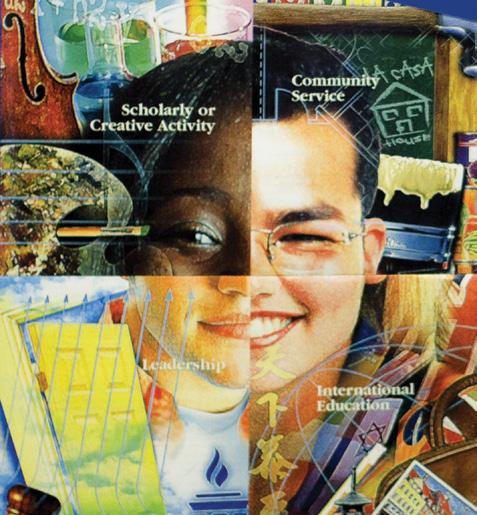
As incoming freshman begin their college career, many are looking for an experience that is unique and will help to shape their future.
Washburn began a program called the Washburn Transformational Experience originally as a requirement to graduate. Through the life of the program, the WTE was tinkered with and eventually changed to an optional portion of what Washburn offers its students. So that begs the question then, “what is a WTE and why take it on?”
“Any one of [the different WTE’s] added to the academic studies makes the experience richer,” said Rick Ellis, director of the community service WTE. “It offers future employers a view that you are more than just the classes you take.”
Specifically, a WTE can be chosen from one of four different fields of em-
ment to locales like Costa Rica, which can still qualify for WTE status.
The community service program consists of 150 hours of service within the community and then a monthly reflection meeting with fellow students to talk about what they have experienced and learned throughout the process. According to Ellis, the community service WTE can range across various different aspects of service.
With the leadership program, students are given a chance not only to learn about what it takes to be a leader, but also to become more aware of the their own personal capabilities. Through the experience, students are required to attain completion of the WTE through two routes. The first is a project that encompasses 150 hours and a classroom component. The second is taking on the path of the Washburn Leadership Institute that includes the same result as the first and gives the student an additional leadership certificate to add to their academic resume.

phasis: Scholarly and creative, international education, community service or leadership. Each of the different categories gives students an opportunity to explore an aspect of college life that in most cases would not be available to them through classes alone.
“There are examples of students who, because of their transformational experiences, changed their field of study and their career paths,” said Jeff Mott, director of the leadership WTE.
With the international education WTE, students have a variety of choices available to them. Students can choose to spend an entire semester abroad, studying at schools that Washburn has a formal exchange policy with, in countries like Austria, Paraguay, Spain and Sweden. Other international trips can be for shorter duration, like ones offered through the modern languages depart-
“Most of our students usually have an idea of what they want to do for a WTE,” said Mott. “Some struggle with finding something though, so we have numerous partners throughout the community, particularly in the non-profit world, that we can match with the students’ interests and passions.”
The final of the four areas is scholarly and creative. This area of the WTE is one that challenges students to go beyond the classroom in their thirst for knowledge. Students wanting to pursue a course of scholarly exploration must first find a professor to be their WTE mentor. Many professors who have a passion for helping their students grow beyond the classroom welcome the challenges of being a WTE mentor.
“I think it’s a great opportunity for students to really develop skills that will help them as they move forward in life,” said Kim Morse, associate professor of history. “Many of the skills needed for someone to complete a scholarly WTE can help them if they choose to move on to graduate school.”


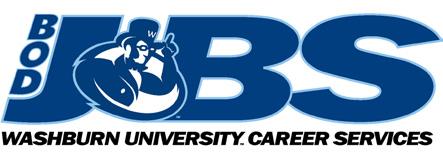

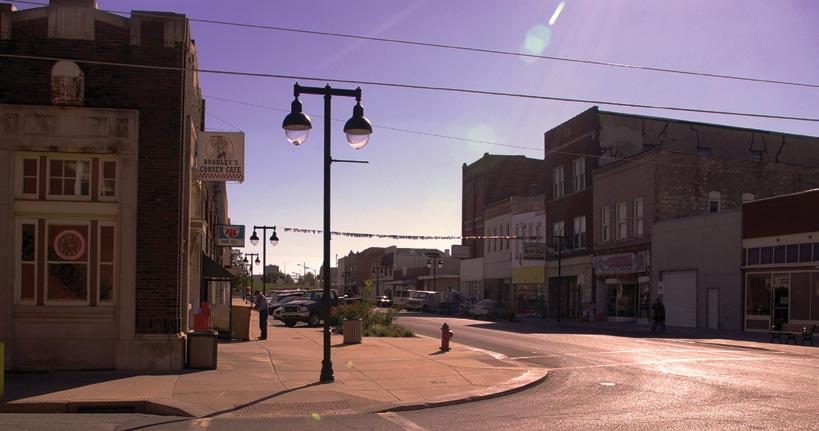

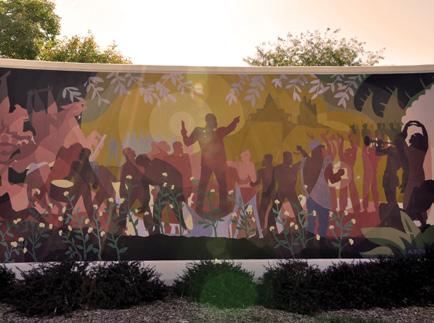



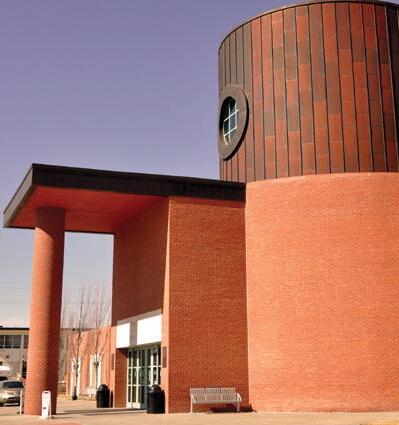

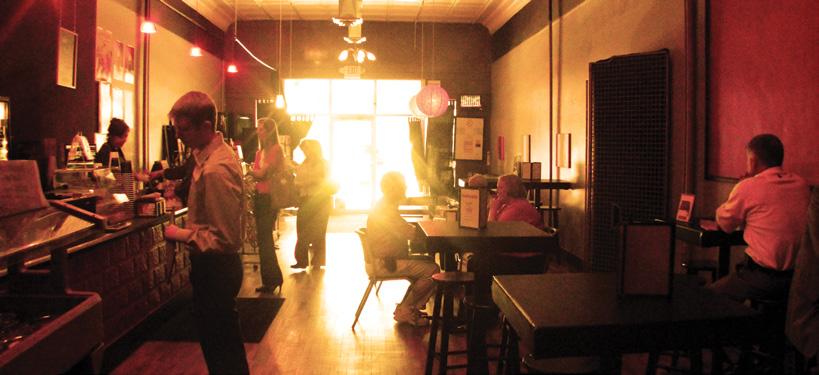
Local Music: Afternoon patrons of The Break Room take part in the quiet atmosphere it has to offer on a typical weekday. But don’t be fooled. Some nights, it’s also a venue for local musicians to show their stuff.
Forsome, Topeka is thought of as that slow, boring, humdrum kind of city. One only has to dig a little deeper to find that isn’t the case.
The capital city has a little bit of everything for everyone. From the different museums around town, to the hotspots to grab a bite, to the different entertainment venues around town, there is no shortage of fun to be had in Topeka.
Interested in art and history? There’s no shortage of opportunities to satisfy an artistic appetite. The Kansas Museum of History, by the Kansas State Historical Society, is one of the crown jewels of Kansas’ state heritage.
“KSHS is a great way for anyone living in Topeka to see all the different aspects of how the state has grown,” said Bobbie Athon, public information officer at KSHS. “We also have a research center for students that are interested in history as well.”
Another hidden gem of Topeka that celebrates the community heritage is Ward-Meade Park located downtown. Entering the park, one is transported back into the 1850s with buildings from the era populating the grounds. With a general store and drug store that serve drinks and candy right out of the period, visitors have an opportunity to kick back and relax in the relative serenity of the 19th century.
Not a history buff? Then perhaps a trip into the fine arts of Topeka will be more appealing. With the advent of First Friday Art Walks, Topeka has become somewhat of an art forward town. Obviously there is the Mulvane Art Museum on the Washburn campus, but for those students wanting to venture out into the city, galleries located all throughout the city like 414 Warehouse downtown and the Collective Art Gallery located near campus in the Westboro mart area are two examples of places that hold art showings at the beginning of the month.
“We welcome all students that want to get out and experience the art scene in Topeka,” said Barbara Waterman-Peters, member of Collective Art gallery. “Topeka has much to offer in terms of arts and we hope students will take advantage of First Friday to come out and mingle and appreciate art.”
For the student that is constantly tapping his or her foot to a tune at all times, there’s always the local music “scene.” Topeka has many locales that feature live music throughout the year. Some of them include the Boobie Trap Bar, The Break Room, Celtic Fox, Bullfrogs Live and many other locations. In particular, The Break Room, located downtown along Kansas Avenue, features Tapas Thursdays, a live entertainment event that features a
diverse lineup that can range from traditional rock, to folk, to bluegrass music; with a little bit of standup comedy thrown in as well.
“Its just an eclectic place to go get a few drinks and listen to something interesting,” said Angie Marquart, Washburn alumna.
As for getting that bite to eat, there’s a plethora of dinning experiences to be had around town. While there are plenty of chain choices along the Wanamaker Road corridor, students shouldn’t take for granted the unique opportunities that local restaurants provide.
One location in particular that is nearby and popular for someone on a budget is Bobo’s Drive In. Bobo’s has been in operation since 1952 and is one of the icons of Topeka. Having been featured on television programs like the Food Network’s “Diners, Drive-ins and Dives,” it would be a shame to live in Topeka and never visit the historic stop. With the recent opening of a second location near the Wanamaker strip, the excuse to get an order of their renowned onion rings and a slice of their delicious apple pie is something that can’t be accepted.
No matter what may interest a student, or Topeka resident, there’s something for everyone.
Washburn University offers study abroad programs in over 25 countries each year. These range from week-long study tours in the summer, to semester or year-long programs.
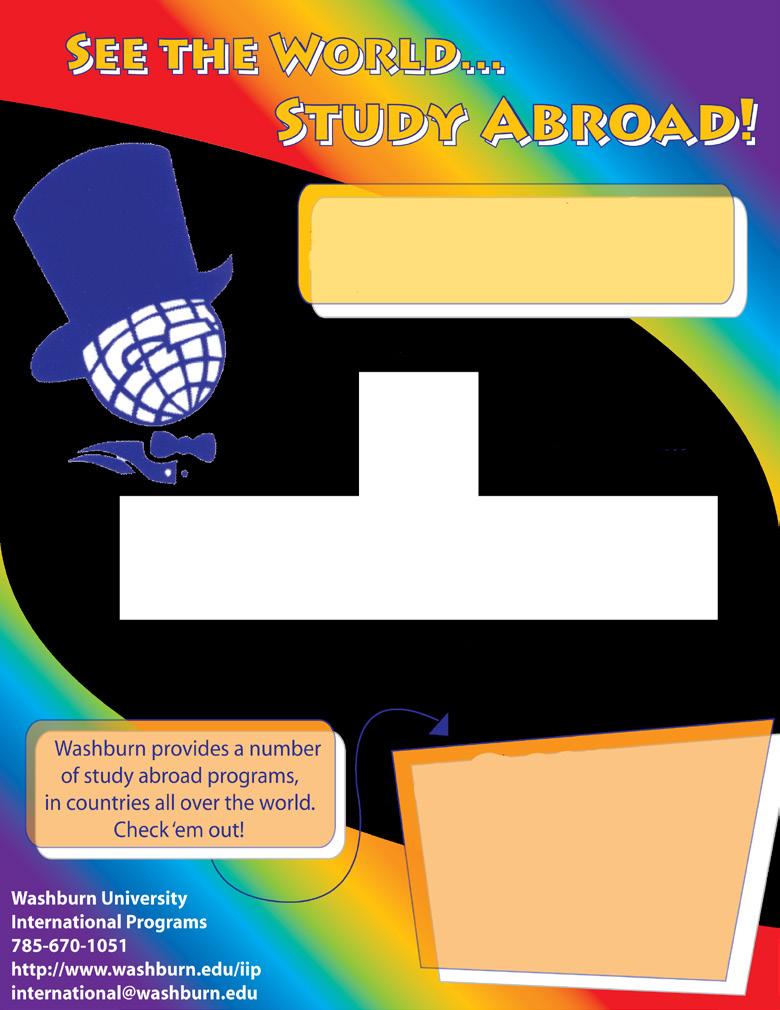

Studying in a foreign country can be one of the most exciting and rewarding experiences of your college career. It is excellent preparation for life and work in our increasingly global community.
How much does it cost?
You pay Washburn tuition when you study abroad with an exchange program. Room and board costs are similar to those in Kansas. Airfare is an added expense, and there are scholarships available to help. Stop by the international house or visit us on-line to learn more!
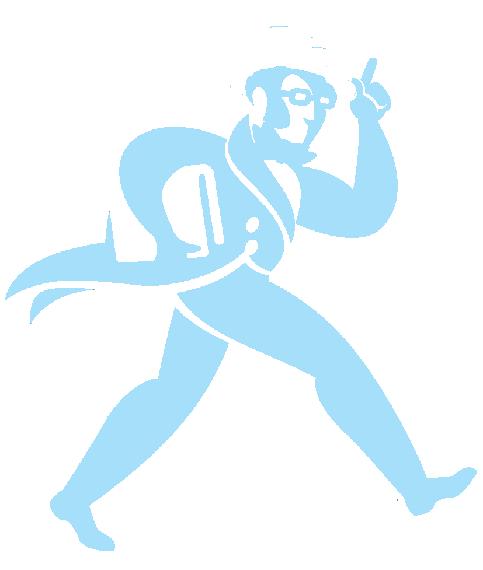
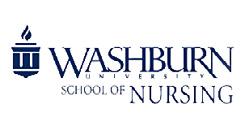
Strong international • study program
Multiple job opportunities
• upon graduation
Graduate school • possibilities
Complete your Study Abroad program as an International Education - Washburn
Transformational Experience and receive a WTE Scholarship.
University of Klagenfurt, Austria
• Latin American University of Science &
• Technology, Costa Rica
• Blaise Pascal University, France
Zhejiang Normal University, China
• University of Osnabrück, Germany
•
• Fukuoka University, Japan
• University of Cantabria, Spain
University of Guanajuato, Mexico
• University of Orebro, Sweden
•
• Magellan Exchange, Western Europe
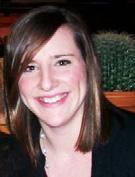
Jana Latendresse
“I will be studying nursing at Queen’s University in Belfast Northern Ireland for 3 months as well as at the University of Szeged in Szeged Hungary for 6 months. It has always been a dream of mine to study abroad, specifically in Ireland, and the School of Nursing gave me an opportunity that I could not pass up. I could not be more excited about my upcoming 9-month trip to Europe!”
Zachary Nehring
“I will be traveling to Savonlinna for 7 months and Szeged for 3 with a few of my fellow classmates. We are all excited for this adventure and experience and grateful to all the schools and people involved in the grant.”
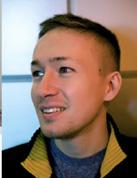

story by Matt Kelly
High GPA? Check. College degree? Check. Knowledge? Check. Only one thing missing—experience.
Many students come to college planning to simply get their credentials, and find a job. But no resume is complete without experience. One of the best ways to build experience in college is through student organizations. Finding the right organization at Washburn can be a challenge, but there are resources to help students get con-
American Medical Student Association/Chemistry Club/ClubMathematica/CollegiateEntrepreneurs Organization/Collegiate National Association for
nected. Not the least of which is the Student Activities and Greek Life department.
“SAGL is all about helping students find passion in what they’re interested in,” said Jessica Neumann, director of SAGL. “Our office doesn’t just say ‘this is what you should do,’ we provide an opportunity for students to get engaged in things that they truly care about.”
Student organizations allow undergraduates the opportunity to meet
people already working in their career fields—which helps them get their feet in doors after graduation. Active students also tend to really enjoy being “college kids.”
“Students that are involved are more likely to graduate, and report having a better college experience. We track our student leader’s grades and compare them to the overall Washburn GPA, and they’re consistently above that,” said Marsha Carrasco Cooper, associate director of the Washburn Leadership Institute.
one... Assistant Club/Washburn UniversityPoliticalScience Club/WashburnUniversity Student Computing Association/Washburn Wellness Club/iTeachers/Alpha Delta Fraternity/Alpha Phi/Delta Chi/Delta Gamma/Greek Council/Intrafraternity Council/Kappa Alpha Psi/Kappa Alpha Theta/Kappa Sigma: Gamma-Nu Colony/Panhellenic Council/Phi Delta Theta/Sigma Phi Epsilon/ Zeta Tau Alpha/Alpha Lambda Delta/Beta Alpha Psi/Beta Beta Beta Biological Honor Society/Kappa Mu Epsilon/Mortar Board Honor Society/Phi Alpha Theta/PhiKappaPhi/PhiThetaKappa/PiKappaDelta/Psi Chi: The National Honor Society in Psychology/SigmaTau Delta/Washburn University Honors Student Council/Alternative Spring Break/Bonner Leaders/ChineseClub/CircleKInternational/DiversityClub/GameClubOfWashburn/HispanicAmerican Leadership Organization/Latin Club/Literacy Education Action Project/Mocha Club Of Washburn/Morita Study Group/Noon Group/Narcotics Anonymous/Open-Minded; Positive;EqualityNon-Discriminative/PsychologyClub/ Social Justice League/Stress BustersYoga, Chi, and MeditationClub/StudentAthleteAdvisoryCommittee/StudentEducationalActivistCoalition/Students
Music/Community of Caring Club/Criminal Justice Association/FutureAlumniNetwork/GermanClub/ International Club/Jazz Coalition/Kaw Yearbook/ LeClubFrancaise/NationalCounciloftheMathmatics Travelers/Occupational Therapy Assistant Organization/OrganizationMondialepourlEducation Prescolaire/PhiBetaLambda/PhysicalEducationMajorsClub/PhysicsandEngineeringClub/Radiologic Technology Student Organization/SON Graduate StudentCouncil/SigmaAlphaIota/Sociolgy/AnthropologyClub/StudentFriendsofMabeeLibrary/StudentMedia/StudentNursesOfWashburn/Students
NationalAssociationTeachersofSinging/TheWashburn Review/Washburn Ad Club/Washburn Association of Percussionists/Washburn Biology Club/ WashburnEducationAssociation/WashburnFinance Society/Washburn Keyboard Society/Washburn Paralegal Association/Washburn Pre-Law Club/ Washburn Residential Council/Washburn Review Online/WashburnSalesandMarketingExecutives/ Washburn Society for Human Resource Management/Washburn Spanish Club/Washburn Student Athletic Trainers Society/Washburn Student Film and Video Association/Washburn Student Social WorkAssociation/WashburnUniversityAssociation ofBands/WashburnUniversityClarinetAssociation/ Washburn University Flute Association/Washburn University Graduate SocialWork Assoc./Washburn University Mock Trial/Washburn University Music TheoryClub/WashburnUniversityPhysicalTherapy
Pick five...
Together Advocating NonViolence in Dating/ Teaching and Interacting withKidsofEducatedStudents/TheBodSquad/Top City Live/Verbum Domini Manet en Aeternum/WU Public Debate Forum/Washburn Alternative Break Program/Washburn Art Students Association/ Washburn Art Team of United Potters/Washburn Black Student Union/Washburn Collegiate 4-H/ WashburnEcobods/WashburnHumanServicesCoalition/Washburn PeaceWorks/Washburn University Buddy Program/Washburn University College Republicans/Washburn University Dance/Washburn University Dancing Blues/WashburnWriter’’s Circle/Young Life/Topeka Rugby Football Club of Washburn/Washburn University Rowing Crew/ Washburn University Running Club/Catholic CampusCenter/ChiAlphaChristianFellowship/Christian Challenge/Ichtus(CampusMinistry)/MuslimStudent Association/StudentAtheistsofWashburn/Campus Activities Board/Washburn Student Government Association/Law School Groups Get involved.
Cooper recommended a three-step process for finding a suitable student organization:
Step 1—Be a part of Welcome Week: Features events such as WU Fest, which will be held on the lawn of the Memorial Union, and include games, prizes, music and representatives from student organizations. Aug. 19-22.
Step 2—Check out the Activities and Majors Fair: Students will be able to explore on campus opportunities. The fair is held in the Washburn Room of the Memorial Union. Aug. 31.
Step 3—Attend a student organization event: After students find an organization, attending a recruitment event or meeting is highly recommended. If it’s not the right fit—then bail. But every student should be able to find something that fits his or her style. Don’t give up.
Only part of the college experience is defined by what takes place in the classroom. Although being “book smart” is vital to a student’s future, there are other forms of knowledge—some things can only be learned through experience.
“We want students to position themselves really well for what they want to do for the rest of their lives, but we also want them to have a good time, and find that club that makes their world go round,” said Cooper.
For more information, visit www. washburn.edu/getalife.

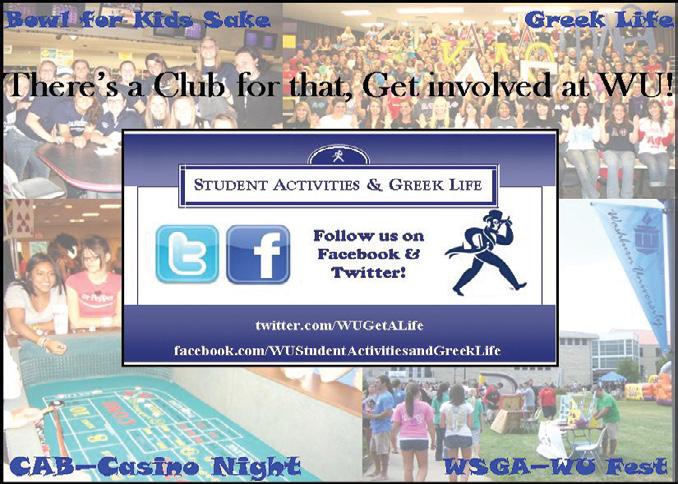
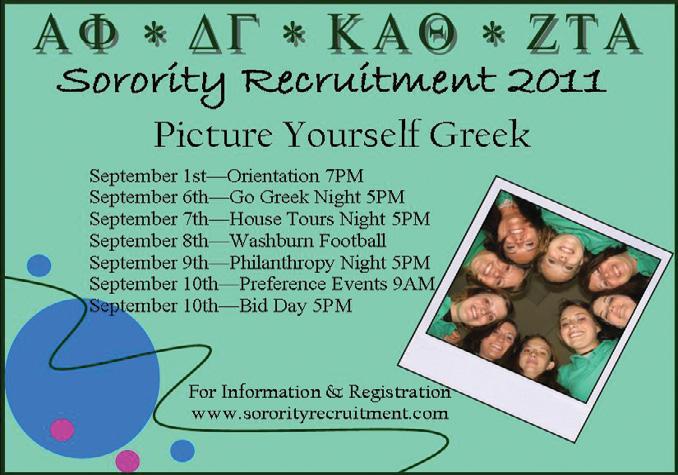
story by Kori Reist
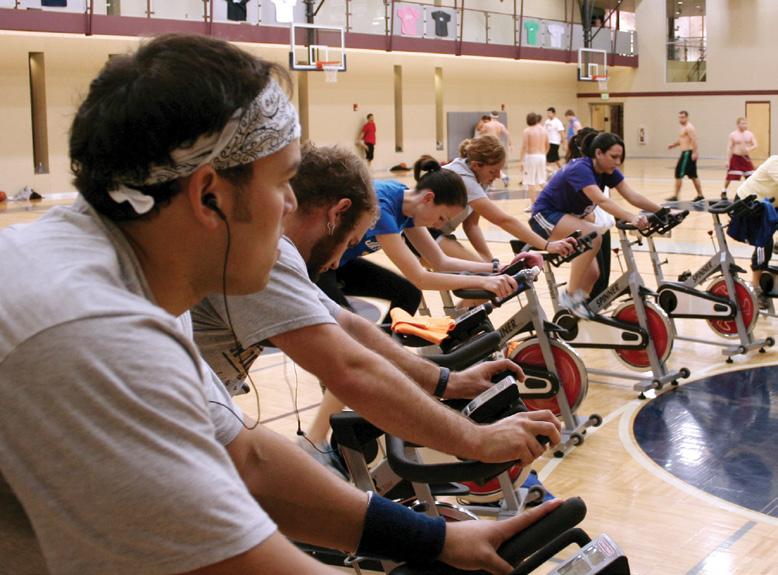
P
eople eat food. They eat lots of food. People exercise so they can eat more food and not feel as bad about it. Physical fitness unarguably prolongs life. Being in good physical health requires exercise and commitment. The Student Recreation and Wellness Center at Washburn University is available to meet what members eat.
The mission of the Student Recreation and Wellness Center is to enrich the quality of campus life by promoting and offering opportunities for physical and mental growth as well as social interaction in healthy surroundings and
superior recreational facilities.
The recreation center is indeed superior and Joel Bluml, director of the SRWC, said he sees a large number of all types of students using it to their advantage.
“We have approximately 100,000 usages per year,” Bluml said. “We are working to find out how many unique people that is. That does not mean we have 100,000 people, just that we have that many usages.”
Within the walls of the SRWC there are a number of physical fitness and health opportunities. Beyond the built-
in attributes and exercise machines are programs designed to promote better health for Washburn students. Bluml guarantees that there is something for everyone.
Group exercise sessions are not only a good way to meet people, they also promote a variety of exercises that are offered free of charge to all Washburn students, staff and faculty. These classes are designed so that participants can work at their own intensity level. Classes change each semester and schedules are available at the SRWC. Class examples include: core, cycling, cycle and

body, and yoga.
“One thing students might not realize is that research shows that students who participate in collegiate recreation programs get better grades and graduate at higher rates than those who don’t,” Bluml said. “I certainly don’t think it’s a cause and effect relationship. I think that the same type of students that actively manage their health and takes care of themselves, is also the same type of student who gets involved on campus, studies, and excels in the classroom.”
More than a wall for climbing, the rock-climbing wall is designed to facilitate top rope, lead climbing, as well as bouldering. Routes are set to challenge the beginner, intermediate and advanced climber. Climbing opportunities are available during restricted hours.
The Wellness Program is designed to assist individuals in establishing lifestyle patterns that will enhance their well being throughout their lives. The services will assist members in achieving fitness
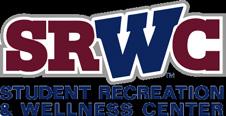
goals and improving their quality of life. They offer fitness instruction incentive programs, consultation opportunities and a wellness resources library.
One such incentive program is Active Ichabod. It’s a program designed to improve total wellness by rewarding participants for demonstrating good exercise, nutrition and daily activity habits. Active Ichabod recognizes all types of physical activity, not just formal exercise.
Another program available through the SRWC is Bod Buddies. This service is provided with the intention to connect members of the Washburn community who share recreational interests. Members simply leave their contact information in the Bod Buddies book located at the front desk of the SRWC. This will allow members to contact or be contacted by individuals who have common interests.
Washburn also has a walking path. According to Bluml, a map of the walking path is available on the SRWC web-
site and a hardcopy can be picked up in the recreation center.
“Another thing that students don’t realize is that we are here to help people live healthier whether they want to exercise within our walls or other places,” Bluml said. “It doesn’t have to be just inside the walls of the SRWC. One of our marketing pushes this year is to be ‘Living Well at Washburn,’ it’s not living well within the walls of the SRWC.”
One thing Bluml hears a lot is that people would like to eat healthy or exercise regularly, but they just don’t have the time. For him, that just means people have not yet put their physical wellbeing at a high enough priority.
“I really want to encourage people to come talk to us and really think about how they view living a healthy lifestyle,” Bluml said.

